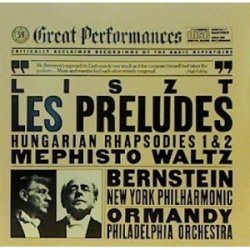Liszt – Les Preludes Hungarian Rapsodies Mephisto Waltz (1988)
Liszt – Les Preludes Hungarian Rapsodies Mephisto Waltz (1988)

1. Les Preludes (Symphonic Poem) 2. Hungarian Rhap No.1 New York Philharmonic Leonard Bernstein – conductor 3. Hungarian Rhap No.2 4. Mephisto Waltz Philadelphia Orchestra Eugene Ormandy – conductor (CBS Masterworks – Great Performances 59)
Liszt was the virtual inventor of the symphonic poem (or tone poem), a form in which a literary or other nonmusical source provides a narrative foundation for a single-movement orchestral work. Liszt's symphonic poems, however, were not exclusively dependent on their source material: The composer's goal was more to distill the essence of the poetic concept in music than to exactly recreate it. Les préludes (1848-1854) is the third, and by far the most popular, of the 12 symphonic poems Liszt wrote during his tenure as Grand Ducal Director of Music Extraordinary at Weimar. All 12 works are dedicated to Princess Carolyne Sayn-Wittgenstein.
Despite the suggestion of its title, Les préludes is by itself a complete, freestanding work. Long before it reached its final form, however, Liszt had envisioned it in another context. In 1844-1845, he composed a cycle for male choir and piano, Les quatre elements, based on poems of Joseph Autran. Liszt planned to introduce the four choruses, which depict the earth, north winds, waves, and stars, with an overture. In the following years, he set aside the choruses while continuing to revise this introductory movement. As it became independent of its original purpose, Liszt stopped referring to it as an "overture," and by 1854 it had became a full-fledged work in its own right. Liszt derived the title from an ode by French poet Alphonse de Lamartine, "Méditations poetiques," which describes the life of man from youthful love through the harsh realities of work and war and finally to self-acceptance. An excerpt from the poem accompanies Liszt's score: "What else is our life than a series of preludes to an unknown song, whose first and solemn notes are intoned by death?"
Though Les préludes was not specifically inspired by Lamartine's text, its final version faithfully reflects the shifting mood sequences of each section of the poem. The musical discourse unfolds in parallel to the themes in the text without providing a direct translation of its elements. A single three-note motive provides the main glue, its various permutations and transformations reflecting the many and varied moods of each section. Another theme, a distant cousin of the original motive, eventually emerges, providing an element of contrast as it also undergoes transformation. Les préludes ends with a return to the three-note motive in its original form, as well as to the contemplative, questioning mood of the opening. ---Margaret Godfrey, Rovi
Mephisto Waltz, for orchestra No. 2. Written between 1880 and 1881 this work, like most of late Liszt's pieces, is intensely original and does away with the rules of tonality. Michael Stegemann quotes a reviewer of the premiere of the work who, horrified at the dissonances, said that the Mephisto-spirit of the work "rejects everything which to us means music, which dances a waltz in 6/8, in all keys are in none, [...] over the gravestones of all the great masters and the graves of all traditions". It is a bright and exhilarating composition, ten minutes of almost relentless rhythmic energy. --- Hector Bellman, Rovi
download: uploaded anonfiles yandex 4shared solidfiles mediafire mega filecloudio
Zmieniony (Poniedziałek, 02 Grudzień 2013 23:17)








